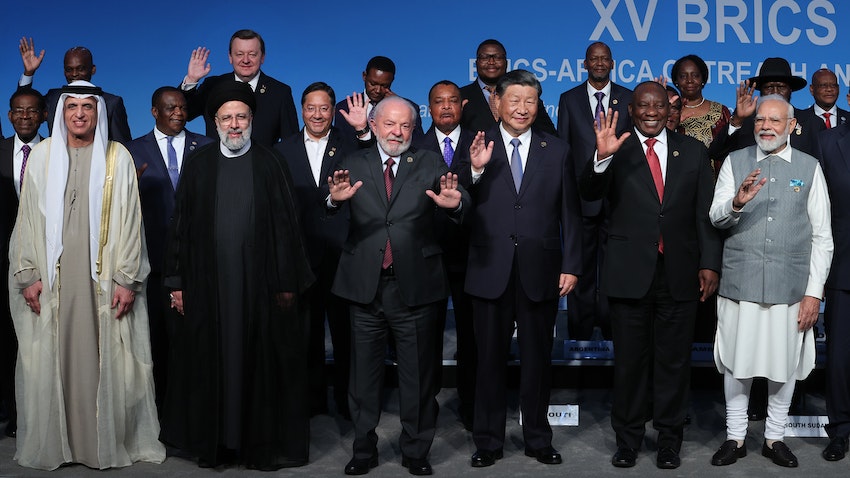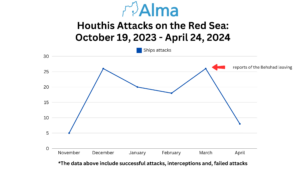The BRICS Forum is an international organization that includes, Brazil, Russia, India, China, and South Africa. The organization’s official mission is to promote international cooperation in various fields, emphasizing equality between its members. However, the organization’s activities, in fact, aim to lessen its members’ reliance on the Western economy, dominated by the G7. This is to create a competing economic and geopolitical power center with that of the United States and the West while creating an “alternative economy” system.
The organization originated as a Russian initiative in 2006, and it has been in its current form since 2010. Cooperation among the Organization’s member countries has been institutionalized and strengthened over time through conferences, yearly meetings, and policy coordination in a variety of areas. For the benefit of its member countries, the group has established an independent bank, the New Development Bank.
It is important to highlight, however, that this is not an entity with a uniform identity, and there are fundamental disparities between the member states in terms of objectives, worldview, philosophy, relations with the United States, and other factors. For example, while Russia and China strive to weaken the dollar’s global status because of their rivalry with the United States and its dominance, India does not necessarily share the same viewpoint.
At the organization’s last annual conference, held in August in South Africa, it was announced that Iran, Saudi Arabia, Egypt, Ethiopia, Argentina, and the United Arab Emirates would join BRICS. The joining of these six countries is expected to take effect in January 2024. The addition of those countries is intended to strengthen the organization’s position as a major global player in the areas of economy, trade, energy, and international relations, among others. In addition, it is anticipated that this action will bolster the ambitions of its member states to establish an alternative economic system.
The addition of the six new members into the organization is not coincidental and has the potential to create a long-term global geopolitical change. This change is affected by several factors:
The population of the 11 BRICS countries accounts for around 45% of the global population. In the not-too-distant future, the multiplicity rate in nations such as India, Egypt, and Ethiopia might lead to the organization representing roughly half of the world’s population.
Furthermore, the GDP (gross domestic product) of the BRICS countries is predicted to be around $30 trillion in 2023, accounting for almost one-third of world GDP. As a result, the organization surpasses the G7 countries combined GDP. To this, it should be noted that the organization’s member countries’ exports of goods, and hence their share of the world market, already stand at around 25%.
The organization also presents impressive figures in the areas of energy and minerals. After the incorporation of these countries, the organization’s total oil production is anticipated to account for 40%-45% of global oil production, surpassing the output of OPEC countries, which accounts for 35%-40%. Iran and Russia have some of the largest gas reserves in the world, while China and India are among the world’s largest consumers of gas and oil. In the field of mining, China, Brazil, and Argentina are presently ranked among the top five nations for their lithium reserves, while other nations have well-developed mining industries for graphite, zinc, copper, iron lead, and other essential minerals.
The success of BRICS in establishing an alternative economic system that alters the world’s power centers and undermines Western dominance has prompted approximately 40 additional nations to apply for membership. Cuba, Venezuela, Bolivia, Congo, Nigeria, Algeria, Kazakhstan, Indonesia, and Malaysia are among the countries mentioned. Although it is not anticipated that these will substantially increase the organization’s power concerning these figures, they do demonstrate the influence of Russia and China and the desire of many nations to alter the current economic and political order.
In light of all this, it is highly likely that the Middle East will also be affected by BRICS.
It seems that among the many possibilities, it may be worth pointing out two main potential developments:
First, the accession of Saudi Arabia, Egypt, and the United Arab Emirates may signal a shift in their attitudes towards the United States and its role in the Middle East. The deterioration of relations between Saudi Arabia and the United States in recent years is well known, as is the frustration of MBS (Saudi Crown Prince Mohammed bin Salman) with the Biden administration. The labeling of MBS as a human rights violator, the unwillingness to authorize arms transactions, the absence of American response to Iranian aggression, the diversion of American attention to Asia, and other factors contributed to this dissatisfaction.
These factors, along with Saudi Arabia’s desire to maintain its status as a major power in the Middle East, contributed to the Saudi royal family’s appeal to seek additional diplomatic channels to support its aspirations. This is reflected, among other things, in the renewal of relations with Iran by means of Chinese mediation, coordinating oil production with Russia, and joining the BRICS. For now, this is a less likely scenario, but Saudi Arabia’s accession to the organization could lead to its rapprochement with the Russia-China-Iran axis in the future.
The same is true for Egypt, whose relations with the United States deteriorated due to a lack of support for Mubarak during the Arab Spring and a subsequent frigid attitude toward the Sisi government. Likewise, it is possible that Egypt’s decision to join BRICS opens new avenues in light of the shift in U.S. policy towards Egypt, the reduction of U.S. involvement in the region, the growing Iranian influence, and the accelerated entry of China as a major player in Africa and the Middle East.
Another possible impact on the Middle East stems from Iran joining BRICS. Iran’s relationships with the member states of the organization are well-known, particularly with China, Russia, and Brazil. Iran’s official membership application was submitted last year, but negotiations have been ongoing for several years. This is an exceptional opportunity for Iran to improve its economic and political situation and lessen the impact of international sanctions and isolation.
Iran’s acceptance into the organization could unlock many formerly restricted markets, both for the export of oil, gas, and other products, as well as for the import of many consumer goods Iran lacks. In addition, Iran will be able to receive various financial and economic services through the BRICS bank, circumventing the global payment system (SWIFT), which has been blocked for Iran since 2018. An indication of the economic potential inherent in Iran’s membership is the fact that trade between Iran and the organization’s five founding members increased by 14% to $38 billion in the past year.
The sanctions imposed by the West on Russia for its actions in the Ukraine conflict have prompted it to promote a trade mechanism that circumvents Western sanctions and refrains from using the dollar, particularly in the oil and gas trade sector. Thus, India recently concluded a number of oil agreements with Russia and the UAE, for which it paid in yuan and rupee, and it is a distinct possibility that Iran will join this trade circle. Considering its current situation and its relations with the United States, Iran ardently supports measures to reduce the use of dollars, as evidenced by a number of remarks made by President Raisi.
If this possibility materializes and Iran begins extensive trade with the organization’s members, it is anticipated that Iran’s economy will grow substantially. This can have several effects.
Iran will likely increase and broaden its regional efforts and support for terrorist groups and its proxy forces in the Middle East. It is anticipated that this will result in an increase in terrorist activities, the quantity and quality of munitions supplied to its proxies, and Iran’s economic, military, and political influence in the region.
This buildup is also anticipated to strengthen its position regarding its nuclear military program. Iran may feel strong enough to pursue nuclear weapons, or it may use its position to extract concessions from the United States and the West on a variety of issues that will contribute to its strengthening and return to the international community, while retaining its status as a nuclear threshold state.
Sources
Deep Dive: Iran hails invite to join BRICS, but few expect major dividends | Amwaj.media
http://infobrics.org/page/history-of-brics
https://www.aljazeera.com/economy/2023/8/24/saudi-arabia-iran-to-join-brics-as-grouping-admits-six-new-members
https://www.csis.org/analysis/six-new-brics-implications-energy-trade#:~:text=Brazil%2C%20Russia%2C%20India%2C%20China,dependence%20on%20Western%20financial%20systems
https://www.eia.gov/international/data/world/petroleum-and-other-liquids/annual-petroleum-and-other-liquids-production?pd=5&p=0000000000000000000000000000000000vg&u=0&f=A&v=mapbubble&a=&i=none&vo=value&t=C&g=00000000000000000000000000000000000000000000000001&l=249ruvvvvvfvtvnvv1vrvvvvfvvvvvvfvvvou20evvvvvvvvvvnvvvs0008&s=94694400000&e=1672531200000&
https://www.reuters.com/business/energy/india-refiners-start-yuan-payments-russian-oil-imports-sources-2023-07-03
https://www.reuters.com/business/energy/india-makes-first-crude-oil-payment-uae-indian-rupees-2023-08-14
https://www.aljazeera.com/news/2023/8/24/analysis-wall-of-brics-the-significance-of-adding-six-new-members
https://www.forbes.com/sites/katharinabuchholz/2023/08/25/rise-of-brics-bloc-continues-through-expansion-infographic/?sh=27e318d4225c
https://www.forbes.com/sites/davidblackmon/2023/08/28/8-consequential-energy-implications-of-the-brics-expansion/?sh=764d63701bfe
https://www.visualcapitalist.com/visualizing-the-brics-expansion-in-4-charts
https://www.reuters.com/world/what-is-brics-who-are-its-members-2023-08-21
https://thewire.in/world/brics-expansion-saudi-arabia-oil-iran
aa.com.tr/en/world/economics-and-politics-what-brics-membership-means-for-iran/2977551#:~:text=Iran%20formally%20applied%20for%20full,addressed%20the%20BRICS%20Plus%20summit.
https://www.thenationalnews.com/world/uk-news/2023/08/22/growth-and-dominance-how-do-the-g7-and-brics-match-up
https://www.statista.com/chart/30638/brics-and-g7-share-of-global-gdp
https://amwaj.media/media-monitor/deep-dive-iran-hails-invite-to-join-brics-but-few-expect-major-dividends






